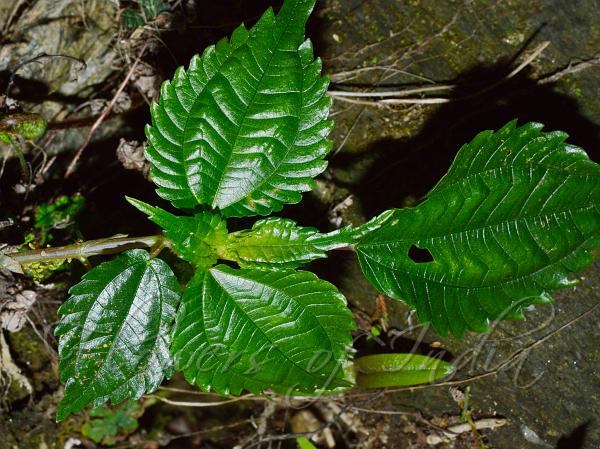|
| East-Asian Clearweed |
|

|

| File size | 1107438 |
| Original date | 5/10/18 11:18 AM |
| Resolution | 3008 x 2000 |
| Flash | Flash fired, return detected |
| Focal length | 60.0mm |
| Exposure time | 1/200s |
| Aperture | 22.0 |
| Focus Distance | |
| Metering Mode | Multi-segment |
| Camera make | NIKON CORPORATION |
| Camera model | NIKON D3200 |
| Sensor type | OneChipColorArea |
|
|
|
|
Photo: |
Botanical name: Pilea martini Family: Urticaceae (Nettle family)
Synonyms: Boehmeria martini
Synonyms: Boehmeria martini
East-Asian Clearweed is a perennial herb with stems
simple or branched, 30-100 cm tall, fleshy, with galls on mid portion
of internodes, hairless or finely velvet-hairy on upper part.
Leaf-stalks are unequal in length, 1-8 cm, finely velvet-hairy or
hairless; leaf blade below pale green, above green, obliquely ovate,
narrowly ovate, or lanceshaped, unequal in size, 7-20 x 3.5-12 cm,
membranous, 3-veined, lateral veins many, lower surface hairless or
finely velvet-hairy when young, upper surface sparsely setulose, base
rounded or nearly heart-shaped, rarely blunt, margin coarsely
sawtoothed-toothed, tip long tapering, tail minutely toothed. Flower
clusters are borne singly. Male cluster is a cyme-like panicle, 4-10 cm
overall, flower-cluster-stalk 2-6 cm; female 1-4 cm, shortly stalked.
Male flowers are reddish, stalkless or stalked, in bud about 1.2 mm;
tepals 4, oblong-ovate, 2 lobes corniculate at tip; stamens 4. Female
flowers are nearly stalkless, in bud about 0.6 mm; tepals fused at
base, unequal, lower lobe boat-shaped, longer, staminodes 3,
scale-like, oblong. East-Asian Clearweed is found in Nepal to East
Himalaya and Central & S. China. Flowering: May-September.
| Identification credit: J.M. Garg | Photographed in Kalimpong, West Bengal. |
• Is this flower misidentified? If yes,